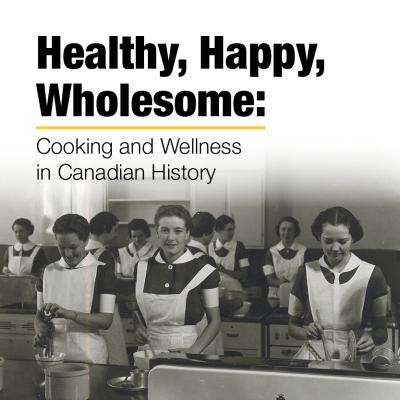
Take a virtual step back in time and see what Canadians ate to stay healthy! The new online exhibit “Healthy, Happy, Wholesome: Cooking and Wellness in Canadian History” curated by history students shows the intrinsic connections between cooking, health, and nutrition throughout Canada’s past.
Part of the ongoing partnership between the Department of History and the library’s Archival and Special Collections team, this HIST*3240: Food History class project offers history students a valuable experiential learning opportunity. Curating this exhibit introduced history students to the type of work done by museum curators, librarians, archivists, web designers, and historical researchers. It also gives these students the opportunity to add to their portfolio when applying to jobs or post-graduate programs, as they can point to the public online exhibit as an example of their work.
“My class was inspired to make this exhibit by the COVID-19 pandemic and ongoing discussions about bodily health, nutrition, and wellness,” said Dr. Rebecca Beausaert, Adjunct Professor in the U of G Department of History.
The exhibit uses 19th and 20th century cookbooks from the University of Guelph’s Canadian Cookbook Collection to draw parallels between the COVID-19 pandemic and other times of crisis in Canada’s past such as the influenza pandemic, the First and Second World Wars, and the Great Depression. Some of the concerns around food, health, and wellness that have emerged from the COVID-19 pandemic actually have long histories as Canadians have defined and redefined health, happiness, and wholesomeness over the years. In the cookbooks that students examined, they found themes that are still relevant today, such as eating local, supporting Canadian farmers, rationing foodstuffs, taking supplements, weight watching, and children’s health.
One such cookbook, Food of the Infant and Growing Child published in 1935 by the Canadian Starch Company, addresses parents’ concerns about children receiving proper nutrition during the Great Depression. However, the book considers products like corn syrup to be nutritional powerhouses, revealing the cookbook to be a marketing tactic that promotes misunderstandings around infant health and nutrition.
Several cookbooks in the collection focus on the healthful properties of salads, such as Salads that are Different (1937) and Salad Secrets (1928), while others try to promote their products as healthy, such as Cowan’s Cocoa Insures a Wealth of Health (1920s) which claims that “children thrive” when fed Cowan’s brand of cocoa powder.
Another familiar theme found in the collection is the importance of consuming local meats, dairy, and produce to sustain good health and contribute to the Canadian economy. Leaflets published by government agencies and organizations such as Why and How to Use Skim-Milk (1922), Butter: Vital for Growth and Health (1920s) and Apples are Good for You! (1942) attempted to persuade Canadians to support domestic farmers and agricultural products.
We invite you to join us for the launch of this new exhibit virtually on Tuesday, May 31 at 7:30 p.m. ET, hosted in partnership with Culinary Historians of Canada.
This online exhibit is part of the larger project What Canada Ate, a growing repository of digitized Canadian cookbooks and contains materials from Archival & Special Collections’ Culinary Collection, one of the largest of its kind in North America.
Those interested in viewing our collections in person can contact library@uoguelph.ca to book a visit.
Questions?
Ask us! We’re here to help.
- Ask Chat is a collaborative service
- Ask Us Online Chat hours
- Contact Us